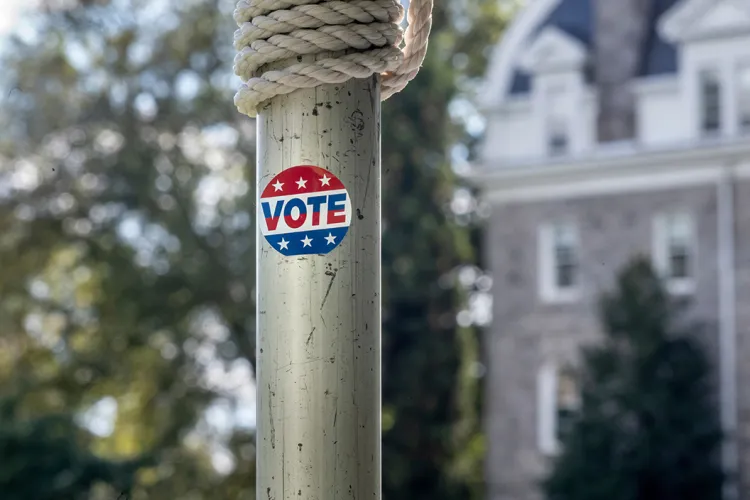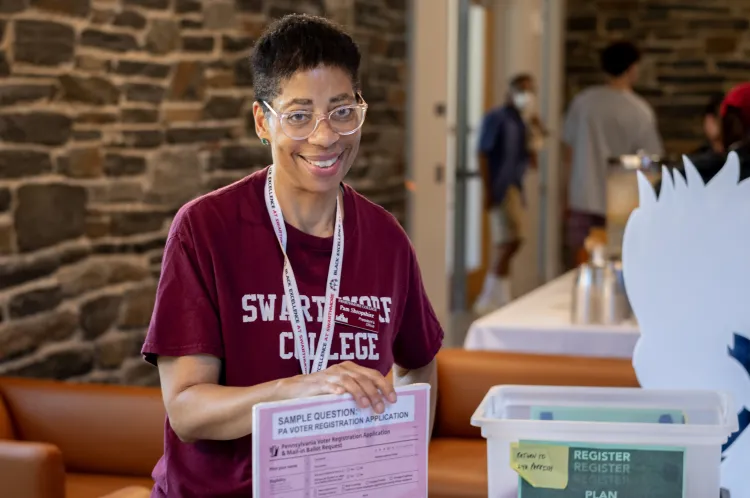“An Unprecedented Opportunity”: Swarthmore Community Engages in Wide Array of Election-Related Events

Americans were faced with “an immensely critical election” in 2024, says Aqua Withers Carello ’25, president of the SwatVotes student group. And that was especially true in the swing state of Pennsylvania.
“College students throughout Pennsylvania [had] an unprecedented opportunity to direct the outcome of national and state elections,” says Carello, adding that SwatVotes’ initiatives are informed by the students’ research experience and coursework, to help their peers “feel both informed and equipped to make a difference on pressing political topics — as is their right.”
SwatVotes helped hundreds of students register this semester, adds Danika Grieser ’26, through publishing articles in the Phoenix, holding events like the presidential debate watch party, and offering sessions to help explain absentee and mail-in voting and the various state registration deadlines.
These efforts are among a wide array of voting-related programming on campus this fall — a reflection of Swarthmore’s core values of inclusivity and interdisciplinary studies. From other get-out-the-vote efforts spearheaded by students to talks and Q&As sponsored by academic departments to less-formal community conversations, the College offered students, staff, and faculty myriad opportunities to learn and think about voting before and after election day.
Here are some of the highlights.
Women’s soccer teammates Katherine Kerman ’27 and Lila Travers ’26 launched a campaign this fall to ensure every athlete on campus is registered to vote.
“We wanted to build off of past years and their initiatives in a positive and fruitful manner,” says Kerman, “because we felt and saw how important this presidential election will be for our country and especially minority rights.”
“We wanted to encourage young people to vote, and athletics is a community we feel close to,” adds Travers. “We wanted to normalize discussing important political events on our team and in the community, so by making it a team effort, it would give rise to important conversations as we near the election.”
One of the first events of the fall semester was a joint Constitution Day event and Cooper Series lecture held Sept. 16. The session, "Jurisprudence and the Pursuit of Justice,” featured Judge Arianna Freeman '01 and Judge Stephanos Bibas.
“We had a strong turnout and lively Q&A segment,” says event co-organizer Harry Hou ’25. “The judges offered insights on the objectivity of deciding cases, book recommendations, and general advice for students considering law school.”
Adds Krista Thomason, associate professor of philosophy, who moderated the Q&A: “I was really pleased with the turnout, especially since the audience was mostly students. The judges spoke very honestly and thoughtfully about the practice of judicial decision-making. I think the judges really helped give everyone a much fuller and more in-depth understanding of the law.”
In late September, Kayla Miller ’25 joined P.O.C. on ecoWURD Magazine to discuss the importance of environmental issues and the involvement of young people in the 2024 election. Among other discussion points, Miller stressed the power of grassroots movements and why new voters are essential this year.
On Sept. 26, the Political Science Department presented “The Lie Detectives: Winning Elections in the Disinformation Age.” Veteran journalist Sasha Issenberg ’02, of the Political Science Department at UCLA, was the speaker. He drew on lessons from his new book, THE LIE DETECTIVES: In Search of a Playbook for Winning Elections in the Disinformation Age, which is the story of the hitherto unknown political operatives who have been leading the political class as it grapples with the problem of how to handle online disinformation — or use it to their own advantage.
On Oct. 10, the Office of Inclusive Excellence and the Office of Diversity, Equity, and Inclusion presented “Political Discourse: Being With Me or Against Me” as part of their Community Conversations series. The conversations brought an array of community members together to discuss, listen, and learn from different perspectives. Participants heard about one another’s lived experience and were free to share their own. Through open, honest, and respectful dialogue, the series aimed to begin building a stronger community.

On Oct. 23, Carol Nackenoff, Richter Professor Emerita of Political Science, and two students, Wyatt Brannon ’26 and Daniel Wu ’26, attended a CNN Town Hall in Delaware County featuring the Democratic candidate for president, current U.S. Vice President Kamala Harris. Following the event, which was geared to undecided voters, Wu was able to speak with vice president Harris for about five minutes on a wide range of topics.
“One moment stood out,” Wu says. “I asked her how, as president, she would work to unite a deeply divided country, especially for young people who haven’t known a truly united America. She described her frequent use of Venn diagrams to highlight both differences and shared ground — a tool she relies on to approach complex issues.”
Brannon shared his takeaways from the experience in the Phoenix, and Nackenoff explained her reasons for attending as an undecided voter in the Chronicle of Higher Education. She is also teaching the Swarthmore Lifelong Learning Course, Election ’24 USA: High Stakes or Hype?, through mid-November.
Also on Oct. 23, the Political Science Gilbert Lecture Series presented "Identity Politics? Black Voters and Democratic Accountability in American Elections." Ismail White, professor of politics and public affairs at Princeton, presented recent research in which he argues that Black Americans’ use of candidate race as information for formulating electoral judgements is much more pragmatic than previous researchers have made it out to be. He explained the logic of support for co-racial representatives by clarifying how race functions as information about the potential for prospective representation of individual interests and information that could potentially bias the uptake of new information about how well interests are being represented.
On Oct. 24, the Lang Center for Civic and Social Responsibility, Swarthmore College Libraries, and the Good Energy Collaborative presented “Climate Justice from Alaska to Pennsylvania and the 2024 Election.” Zach Brown of the Tidelines Institute shared his research on climate impacts occurring in Alaska and how they impact citizens in Pennsylvania. Participants discussed the importance of climate justice and building on environmental connection across the nation.
“Dr. Brown's talk inspired students on how effective action can be taken for climate justice,” says Ariza Nanji ’24 of the Good Energy Collaborative, which organized the event. “Every vote plays a huge role in determining our climate's future, and we must take every choice on the ballot seriously. Zach's talk put into perspective the movement of money and how much power we have as Pennsylvania voters in this upcoming election.”
On Oct. 26, the College presented the first Night Owls event of the year: “What Actually is Democracy?” Joining Night Owls organizer and Assistant Professor of Political Science Jonny Thakkar was Daniel Wodak, associate professor of philosophy at the University of Pennsylvania and associate director of Penn’s Institute for Law and Philosophy. The discussion posed various questions, including, “What is the best way to interpret the ideal of ‘one person, one vote’?” and “Is a democracy a society in which everyone gets the same opportunity to influence the law, for instance, or one in which everybody actually does influence the law to the same degree?” These are the types of questions integral to democratic activity, but often skipped over with ordinary political discourse, says Thakkar. “Philosophers tend to find that odd,” he adds. “If we don't know what democracy means, how can we be so confident that it's worth protecting?”
On Oct. 28, the Economics and Political Science departments presented “Polls, Policy, and The Trajectory of Democracy: A Panel on Election 2024.” Dan Hopkins, a political scientist at the University of Pennsylvania; Sam Wang, founder of the Electoral Innovation Lab at Princeton University; and Emily Zackin ’02 of the Political Science Department at Johns Hopkins led the panel. The discussion, moderated by Associate Professor of Economics Syon Bhanot and Assistant Professor of Political Science Warren Snead, explored many of the questions and topics on people's minds this election season, from how individuals can best make a difference pre-election to the serious implications for democracy and policy of the possible outcomes on election night.
On Oct. 29, Carebridge, the College’s employee assistance program, presented the webinar “Coping with Stress During Election Season.” No matter your political affiliation, the organizers noted, tensions run high during election season. The webinar offered tips for reducing stress and finding peace regardless of participants’ preferred outcome. [Employees can register to watch it on demand]
On Oct. 30, the Delaware County Elections Office (DELCO) brought a voting machine to campus for a hands-on demonstration of how these machines work. All students, faculty and staff were invited to “flex their democracy muscles by casting an unofficial vote for fun.” DELCO staff also talked attendees through the mechanics of what they can expect on Election Day.

Pam Shropshire, special assistant of presidential initiatives, has been leading Swarthmore’s Get Out the Vote (GOTV) committee for four-plus years.
The College’s Get Out the Vote Committee (GOTV) partnered with the Library’s Digital Scholarship Program and the Makerspace for a unique tabling experience at the Nov. 1 Garnet Day. The GOTV table served as a one-stop shop for voting questions, last-minute Election Day tips, copies of sample ballots, and directions to the polls. There was also a fun craft project — those who brought a t-shirt or tote bag could “bedazzle” them with a special decal inspired by an engraved block from the Swarthmore College Peace Collection. It was the latest in a series of events this fall from the GOTV, which included a well-attended Trivia Night in early October.
On Wednesday, Nov. 6, the Lang Center for Civic & Social Responsibility and the Political Science Department presented: “Election Night 2024: What Just Happened and What’s to Come.” Faculty from the Political Science and Sociology departments led a panel discussion and Q&A that reflected on election night and the future of American democracy. Panelists included faculty members Daniel Laurison '00, Keith Reeves '88, Susanne Schwarz, Warren Snead, and Ben Berger.
On Nov. 7, the College community participated in a post-election lunch panel discussion: "Global Reactions to the U.S. Elections: International Perspectives and Implications.” The panel featured professors from Modern Languages and Literatures and Spanish departments sharing insights on international media coverage and public reactions to the U.S. elections. The conversation spanned countries and regions aligned with their language expertise, offering a wide range of global perspectives and implications.



